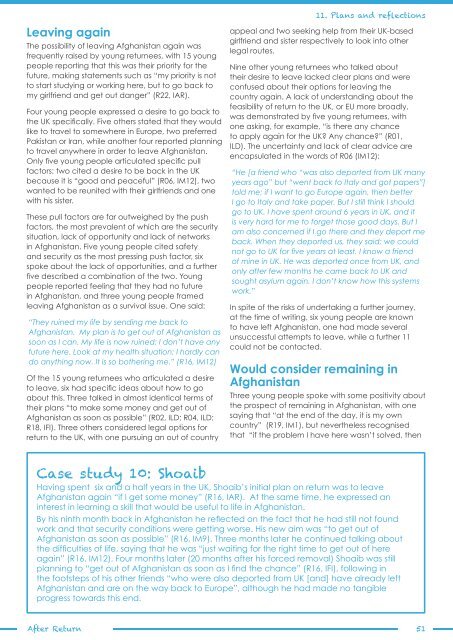After Return
After%20Return_RSN_April%202016
After%20Return_RSN_April%202016
You also want an ePaper? Increase the reach of your titles
YUMPU automatically turns print PDFs into web optimized ePapers that Google loves.
11. Plans and reflections<br />
Leaving again<br />
The possibility of leaving Afghanistan again was<br />
frequently raised by young returnees, with 15 young<br />
people reporting that this was their priority for the<br />
future, making statements such as “my priority is not<br />
to start studying or working here, but to go back to<br />
my girlfriend and get out danger” (R22, IAR).<br />
Four young people expressed a desire to go back to<br />
the UK specifically. Five others stated that they would<br />
like to travel to somewhere in Europe, two preferred<br />
Pakistan or Iran, while another four reported planning<br />
to travel anywhere in order to leave Afghanistan.<br />
Only five young people articulated specific pull<br />
factors: two cited a desire to be back in the UK<br />
because it is “good and peaceful” (R06, IM12), two<br />
wanted to be reunited with their girlfriends and one<br />
with his sister.<br />
These pull factors are far outweighed by the push<br />
factors, the most prevalent of which are the security<br />
situation, lack of opportunity and lack of networks<br />
in Afghanistan. Five young people cited safety<br />
and security as the most pressing push factor, six<br />
spoke about the lack of opportunities, and a further<br />
five described a combination of the two. Young<br />
people reported feeling that they had no future<br />
in Afghanistan, and three young people framed<br />
leaving Afghanistan as a survival issue. One said:<br />
“They ruined my life by sending me back to<br />
Afghanistan. My plan is to get out of Afghanistan as<br />
soon as I can. My life is now ruined; I don’t have any<br />
future here. Look at my health situation; I hardly can<br />
do anything now. It is so bothering me.” (R16, IM12)<br />
Of the 15 young returnees who articulated a desire<br />
to leave, six had specific ideas about how to go<br />
about this. Three talked in almost identical terms of<br />
their plans “to make some money and get out of<br />
Afghanistan as soon as possible” (R02, ILD; R04, ILD;<br />
R18, IFI). Three others considered legal options for<br />
return to the UK, with one pursuing an out of country<br />
appeal and two seeking help from their UK-based<br />
girlfriend and sister respectively to look into other<br />
legal routes.<br />
Nine other young returnees who talked about<br />
their desire to leave lacked clear plans and were<br />
confused about their options for leaving the<br />
country again. A lack of understanding about the<br />
feasibility of return to the UK, or EU more broadly,<br />
was demonstrated by five young returnees, with<br />
one asking, for example, “is there any chance<br />
to apply again for the UK? Any chance?” (R01,<br />
ILD). The uncertainty and lack of clear advice are<br />
encapsulated in the words of R06 (IM12):<br />
“He [a friend who “was also deported from UK many<br />
years ago” but “went back to Italy and got papers”]<br />
told me; if I want to go Europe again, then better<br />
I go to Italy and take paper. But I still think I should<br />
go to UK. I have spent around 6 years in UK, and it<br />
is very hard for me to forget those good days. But I<br />
am also concerned if I go there and they deport me<br />
back. When they deported us, they said; we could<br />
not go to UK for five years at least. I know a friend<br />
of mine in UK. He was deported once from UK, and<br />
only after few months he came back to UK and<br />
sought asylum again. I don’t know how this systems<br />
work.”<br />
In spite of the risks of undertaking a further journey,<br />
at the time of writing, six young people are known<br />
to have left Afghanistan, one had made several<br />
unsuccessful attempts to leave, while a further 11<br />
could not be contacted.<br />
Would consider remaining in<br />
Afghanistan<br />
Three young people spoke with some positivity about<br />
the prospect of remaining in Afghanistan, with one<br />
saying that “at the end of the day, it is my own<br />
country” (R19, IM1), but nevertheless recognised<br />
that “if the problem I have here wasn’t solved, then<br />
Case study 10: Shoaib<br />
Having spent six and a half years in the UK, Shoaib’s initial plan on return was to leave<br />
Afghanistan again “if I get some money” (R16, IAR). At the same time, he expressed an<br />
interest in learning a skill that would be useful to life in Afghanistan.<br />
By his ninth month back in Afghanistan he reflected on the fact that he had still not found<br />
work and that security conditions were getting worse. His new aim was “to get out of<br />
Afghanistan as soon as possible” (R16, IM9). Three months later he continued talking about<br />
the difficulties of life, saying that he was “just waiting for the right time to get out of here<br />
again” (R16, IM12). Four months later (20 months after his forced removal) Shoaib was still<br />
planning to “get out of Afghanistan as soon as I find the chance” (R16, IFI), following in<br />
the footsteps of his other friends “who were also deported from UK [and] have already left<br />
Afghanistan and are on the way back to Europe”, although he had made no tangible<br />
progress towards this end.<br />
<strong>After</strong> <strong>Return</strong> 51


